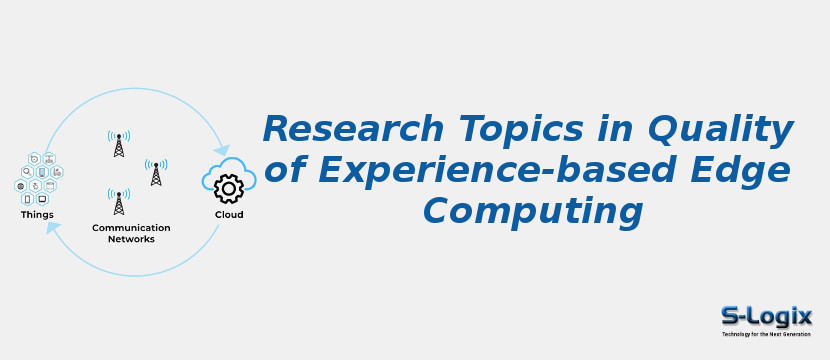Quality of Experience(QoE) is defined as “a model of all human subjective and objective condition needs and experiences resulting from human interactions with technology and business article in a specific context” Quality of Experience (QoE) based Edge Computing refers to a computing paradigm that prioritizes delivering a high-quality end-user experience in terms of performance, latency, and availability by processing data closer to the source, rather than relying solely on centralized cloud computing.
Edge computing enables applications and services to run locally on devices at the edge of a network, thereby reducing latency and increasing data processing speed. By incorporating QoE considerations into edge computing, a more seamless and responsive experience can be delivered to users, leading to increased customer satisfaction and reduced churn rates. Instantiate or migrate personalized services at the network edge, nearby end users to support user mobility and attain high Quality of Experience(QoE).
• Contextual Factors: Contextual factors, such as the location, device, and network conditions, also play a role in determining the QoE in edge computing.
• Bandwidth: The bandwidth available to edge devices affects the speed at which data can be transmitted, impacting the QoE.
• Network Reliability: The network reliability used by edge devices directly impacts the availability of data and the QoE.
• User Expectations: User expectations play a critical role in determining the QoE. An application that meets or exceeds user expectations will be rated higher regarding QoE than one that falls short.
• Application Design: The application-s design, including the user interface and navigation, can significantly impact the QoE.
• Latency: Latency pertains to the time it takes for data to be processed and transmitted between the edge device and the user. Low latency is critical to providing a responsive and seamless experience.
• Processing Power: The processing power of edge devices determines how quickly they can process data and respond to user requests, affecting the QoE.
• Adaptive Bit-rate Algorithms: The algorithms dynamically adjust the video bit-rate based on the network conditions, ensuring that the video quality remains optimal for users.
• Latency Reduction Algorithms: The algorithms use data compression and pre-processing techniques to reduce latency, improving the speed and responsiveness of data processing.
• Resource Allocation Algorithms: The algorithms allocate resources such as CPU, memory, and network bandwidth to applications and services running on edge devices, ensuring the QoE is optimized for each user.
• Optimizing Latency: Further research is needed to optimize latency in edge computing and reduce the time it takes for data to be processed and transmitted.
• Machine Learning for QoE Optimization: Machine learning algorithms can optimize QoE in edge computing by predicting user behavior, allocating resources, and optimizing network performance.
• Integration with 5G Networks: 5G networks offer low latency and high-speed connectivity, making them well-suited for edge computing. Further research is needed to optimize the integration of edge computing with 5G networks.
• Edge-Cloud Integration: Research is needed to optimize the integration of edge and cloud computing to ensure that the QoE is optimized and resources are used efficiently.
• Quality of experience and access network traffic management of HTTP adaptive video streaming
• Quality of Experience-based Routing of Video Traffic for Overlay and ISP Networks.
• User quality of experience estimation using social network analysis.
